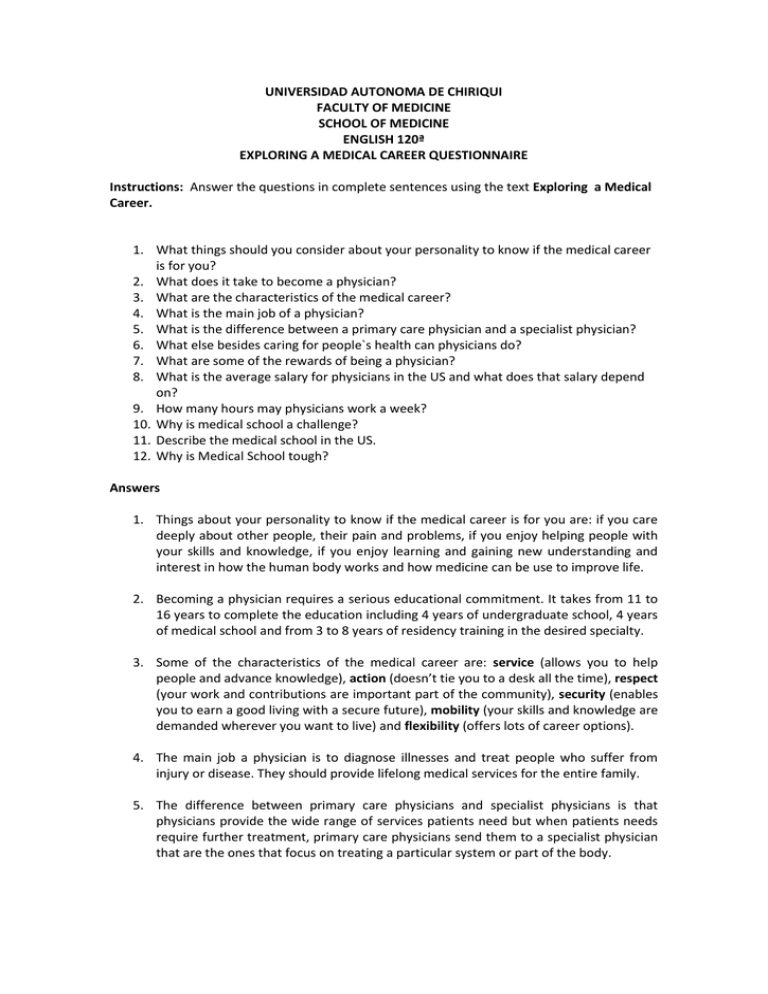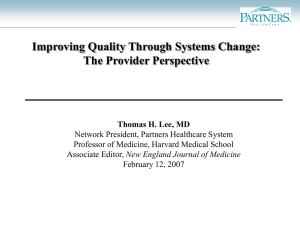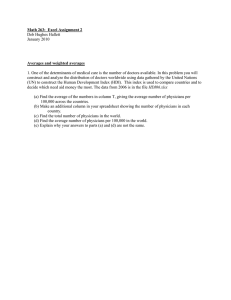UNIVERSIDAD AUTONOMA DE CHIRIQUI FACULTY OF MEDICINE SCHOOL OF MEDICINE ENGLISH 120ª
advertisement

UNIVERSIDAD AUTONOMA DE CHIRIQUI FACULTY OF MEDICINE SCHOOL OF MEDICINE ENGLISH 120ª EXPLORING A MEDICAL CAREER QUESTIONNAIRE Instructions: Answer the questions in complete sentences using the text Exploring a Medical Career. 1. What things should you consider about your personality to know if the medical career is for you? 2. What does it take to become a physician? 3. What are the characteristics of the medical career? 4. What is the main job of a physician? 5. What is the difference between a primary care physician and a specialist physician? 6. What else besides caring for people`s health can physicians do? 7. What are some of the rewards of being a physician? 8. What is the average salary for physicians in the US and what does that salary depend on? 9. How many hours may physicians work a week? 10. Why is medical school a challenge? 11. Describe the medical school in the US. 12. Why is Medical School tough? Answers 1. Things about your personality to know if the medical career is for you are: if you care deeply about other people, their pain and problems, if you enjoy helping people with your skills and knowledge, if you enjoy learning and gaining new understanding and interest in how the human body works and how medicine can be use to improve life. 2. Becoming a physician requires a serious educational commitment. It takes from 11 to 16 years to complete the education including 4 years of undergraduate school, 4 years of medical school and from 3 to 8 years of residency training in the desired specialty. 3. Some of the characteristics of the medical career are: service (allows you to help people and advance knowledge), action (doesn’t tie you to a desk all the time), respect (your work and contributions are important part of the community), security (enables you to earn a good living with a secure future), mobility (your skills and knowledge are demanded wherever you want to live) and flexibility (offers lots of career options). 4. The main job a physician is to diagnose illnesses and treat people who suffer from injury or disease. They should provide lifelong medical services for the entire family. 5. The difference between primary care physicians and specialist physicians is that physicians provide the wide range of services patients need but when patients needs require further treatment, primary care physicians send them to a specialist physician that are the ones that focus on treating a particular system or part of the body. 6. Besides caring for people`s health physicians can work on researches, also academics physicians share their skills and wisdom by teaching medical students and residents, others work with health maintenance organizations, pharmaceutical companies, medical device manufacturers, health insurance companies between others. 7. Physicians obtain many rewards some of them are personally, intellectually and financially. 8. The average salary for physicians in the US is $160,000 a year but this amount can vary depending on where physicians live and what type of medical specialty they practice. 9. The hours physicians work per week can be long and unpredictable. Many physicians work more than 60 hours a week and they also have to respond to emergencies and be on call for their patients. 10. The medical school is a challenge because you´ve got to be committed to learning if you plan to take responsibility for people´s health and well-being. 11. The medical school at the U.S during the first two years teach the basic sciencesanatomy, biochemistry, physiology, microbiology as well as behavioral sciences. They teach fundamental techniques of taking medical history and examining patients. Then at third year they take students to the hospital to observe and work with experienced doctors. At this time they show students the wide variety of career paths within specialties. The final years is a mix of required and elective courses where they gain additional experience caring for patients. After medical school students will spend from 3 to 7 years in a residency where they gain further experience and training in the specialty chosen. 12. Medical school is tough because you will be demanded of you both in the volume of information you will be expected to master and the rate at which you will be expected to learn. You´ll need good study habits and time management skills as a strong academic background. You´ve got to be committed to learning if you plan to take responsibility for people´s health and well-being. Nathalie Espinoza 4-772-1476



